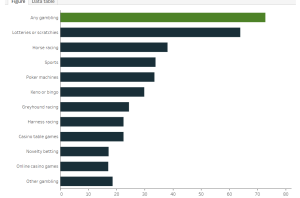
Statistics indicate that Australians lose approximately 25 billion dollars annually through legal gambling, positioning the country as the one with the highest per capita loss worldwide.Last fiscal year, state and territory treasuries collected approximately 7 billion dollars in gambling taxes – a source of revenue that the government increasingly relies on.
Legal gambling laws have brought substantial economic revenue to both the gambling industry and the government. However, what are the costs involved? It is often said that the red-eyed gamblers themselves are not pitiable, but their heartbroken and weeping family members inevitably evoke sighs at the havoc wrought by gambling.

Who is benefiting and who is giving?
According to the panel survey data provided by the Australian Gambling Research Centre, 73% of Australians aged 18 and above have spent money on one or more gambling products in the past twelve months. Lottery and scratch cards have the highest participation rate (64%), followed by horse racing (39%), sports gambling (34%), and poker and poker machines (33%).

The high gambling rate can be attributed to the fact that state and territory governments implemented and relaxed restrictions at different times in 2020 and 2021, which reinvigorated the gambling industry that had been suppressed during the COVID-19 pandemic.Why would the government support the lifting of the ban on gambling-related laws? Since 2013, registered clubs in New South Wales alone have used $152 million in poker machine profits through the ClubGRANTS program for grassroots sports, disaster preparedness centers and art venues.Casino. Gambling operators and clubs have provided tens of thousands of jobs in terms of hotels, IT and compliance. Moreover, the gambling tourism industry was already worth 1.53 billion dollars in 2022 and is expected to double by 2032.
It appears that the gambling industry has indeed profited society and the government. However, is this truly the case? On average, each adult loses $1,200 annually. Suburbs with a high concentration of slot machine sites and low-income populations experience the highest per capita losses. Nearly half of all gamblers are at risk of harm, including depression, substance abuse, and suicide related to gambling issues.What is more serious is that 30% of teenagers aged 12 to 17 were reported to be involved in gambling, and the habit rose to 46% by the age of 19.Gambling is not only affecting the living habits of some adults but has also gradually permeated into some groups of teenagers.Marital breakdowns, bankruptcies, and crimes have imposed a burden of approximately billions of dollars on health, legal, and welfare systems.
The gambling industry in Australia has generated billions of dollars in tax revenue and community funds, supported employment, but it has also resulted in world-record losses and widespread harm, with nearly half of the gamblers at risk.
The most costly lesson
LGM (anonymous) still recalls the night he first opened the online Texas Hold ’em poker platform. It was on a summer night in 2021 when he opened that Pandora’s box for the first time. The tense gameplay, the thrill of victory, and the roller-coaster-like experience tightly gripped his heart.After a period of online gambling, some “gambling friends” he met introduced him to Macau (the only legal gambling place in China). The three days and two nights there made him completely addicted. Slot machines, poker machines, roulette and the prosperity of casinos completely blinded him.Little did he know that his empty wallet and missing tuition fees would alert his parents to something being amiss.
After the gambling incident was exposed, his parents promptly sent him to a gambling treatment institution. After more than a month of gambling rehabilitation guidance, he had new feelings.“Those days were always tough. We were cut off from the Internet every day and had daily counseling sessions. This feeling is like being trapped on an isolated island, and at the same time, it constantly reduces my passion for gambling.”he said.
He still harbors a grudge against that period of psychotherapy to this day. The experience of being addicted to gambling caused him severe psychological trauma. Reflecting on the money he had lost in the past and the concerns of his family, he felt deeply remorseful.“This is truly the most expensive lesson I’ve ever taken in my life. If I could go back in time, I just want to slap myself in the face when I opened the online gambling platform.”
A hopeful future
LGM might still play poker with some friends on weekends, but it’s all for entertainment rather than gambling. Only lessons can make people grow, but will everyone learn to give up and exercise restraint?
Australia’s multibillion-dollar gambling boom has transcended the narrative of harmless entertainment; it now resembles a slowly unfolding public health disaster. The extent to which policymakers choose incremental solutions or implement nationwide, potentially harmful, comprehensive reforms will dictate how many Friday night jackpots transform into Monday morning crises.Policy makers are now faced with a balancing act: they must capitalize on the upward momentum of the economy while also implementing consistent measures to mitigate nationwide damage, such as implementing universal spending caps, enforcing stricter advertising restrictions, and ensuring robust data reporting.
Australia’s gambling policy over the next decade must strike a balance between generating revenue and ensuring welfare. The adoption of a national cashless gaming card, setting loss limits, and real-time identification of risky games are imperative. Gambling advertisements should be banned during home viewing hours, and applications must display clear hazard warnings. Operators should contribute 1% of their turnover to an independent fund dedicated to treatment and research, and expand culturally appropriate consultation services, particularly in remote communities. Tax incentives for clubs should be shifted towards sports and arts activities that are not dependent on slot machine revenue. Transparent sharing of machine-level data will assist regulatory agencies, scholars, and fintech innovators in designing a safer gambling environment for all users.
Share your story:📝Instagram
Support services are available 24 hours a day, 7 days a week:









Be the first to comment